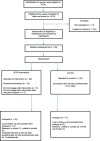'Walk this way': results from a pilot randomised controlled trial of a health coaching intervention to reduce sedentary behaviour and increase physical activity in people with serious mental illness
- PMID: 31533686
- PMCID: PMC6749630
- DOI: 10.1186/s12888-019-2274-5
'Walk this way': results from a pilot randomised controlled trial of a health coaching intervention to reduce sedentary behaviour and increase physical activity in people with serious mental illness
Abstract
Background: Cardiovascular disease (CVD) is the leading cause of premature death among people with serious mental illness (SMI). Sedentary behaviour (SB) is an independent risk factor for CVD and mortality and people with SMI are highly sedentary. We developed a health coaching intervention called 'Walk this Way' to reduce SB and increase physical activity (PA) in people with SMI and conducted a pilot randomised controlled trial (RCT) to test its feasibility and acceptability.
Methods: We randomised people with SMI from three community mental health teams into either the WTW intervention or treatment as usual. The WTW intervention lasted 17 weeks and included an initial education session, fortnightly coaching, provision of pedometers and access to a weekly walking group. Objective SB and PA were measured with accelerometers. Cardiometabolic risk factors and wellbeing measures were collected.
Results: We recruited 40 people of whom 33 (82.5%) were followed up. 13/20 (65%) of participants allocated to the coaching intervention completed it. In the intervention group SB decreased by 56 min and total PA increased by 32 min per day on average which was sustained 6 months later. There was no change in PA or SB in the control group. When interviewed, participants in the intervention found the intervention helpful and acceptable. No adverse events were reported from the intervention.
Conclusions: The intervention was feasible and acceptable to participants. Preliminary results were encouraging with improvement seen in both SB and PA. A larger study is needed to assess the effectiveness of the intervention and address any implementation challenges.
Trial registration: ISRCTN Registry identifier: ISRCTN37724980 , retrospectively registered 25 September 2015.
Keywords: Metabolic syndrome; Physical activity; Psychosis; Sedentary behaviour; Serious mental illness.
Conflict of interest statement
FG has received support or honoraria for CME, advisory work and lectures from Bristol- Myers Squibb, Janssen, Lundbeck, Otsuka, Roche, and Sunovion, and has a family member with professional links to Lilly and GSK, including shares. TC has received honoraria and travel support from pharma companies Lundbeck UK, Sanofi Aventis and Otsuka. He holds research grants from governmental and charitable research organisations. All other authors declare they have no conflicts of interest.
Figures
Similar articles
-
'Walk This Way' - a pilot of a health coaching intervention to reduce sedentary behaviour and increase low intensity exercise in people with serious mental illness: study protocol for a randomised controlled trial.Trials. 2016 Dec 12;17(1):594. doi: 10.1186/s13063-016-1660-2. Trials. 2016. PMID: 27955680 Free PMC article. Clinical Trial.
-
Sexual health promotion in people with severe mental illness: the RESPECT feasibility RCT.Health Technol Assess. 2019 Dec;23(65):1-136. doi: 10.3310/hta23650. Health Technol Assess. 2019. PMID: 31854292 Free PMC article. Clinical Trial.
-
Smoking Cessation Intervention for severe Mental Ill Health Trial (SCIMITAR): a pilot randomised control trial of the clinical effectiveness and cost-effectiveness of a bespoke smoking cessation service.Health Technol Assess. 2015 Mar;19(25):1-148, v-vi. doi: 10.3310/hta19250. Health Technol Assess. 2015. PMID: 25827850 Free PMC article. Clinical Trial.
-
A health promotion intervention to improve lifestyle choices and health outcomes in people with psychosis: a research programme including the IMPaCT RCT.Southampton (UK): NIHR Journals Library; 2020 Jan. Southampton (UK): NIHR Journals Library; 2020 Jan. PMID: 31999410 Free Books & Documents. Review.
-
Interventions with potential to reduce sedentary time in adults: systematic review and meta-analysis.Br J Sports Med. 2015 Aug;49(16):1056-63. doi: 10.1136/bjsports-2014-094524. Epub 2015 Apr 23. Br J Sports Med. 2015. PMID: 25907181 Review.
Cited by
-
Framework for understanding movement and physical activity in patients diagnosed with psychosis.BMJ Ment Health. 2024 Feb 1;27(1):e300878. doi: 10.1136/bmjment-2023-300878. BMJ Ment Health. 2024. PMID: 38302410 Free PMC article.
-
Effectiveness of physical activity monitors in adults: systematic review and meta-analysis.BMJ. 2022 Jan 26;376:e068047. doi: 10.1136/bmj-2021-068047. BMJ. 2022. PMID: 35082116 Free PMC article.
-
A study protocol for a randomised controlled feasibility trial of an intervention to increase activity and reduce sedentary behaviour in people with severe mental illness: Walking fOR Health (WORtH) Study.Pilot Feasibility Stud. 2021 Nov 15;7(1):205. doi: 10.1186/s40814-021-00938-5. Pilot Feasibility Stud. 2021. PMID: 34782018 Free PMC article.
-
Supporting physical activity through co-production in people with severe mental ill health (SPACES): protocol for a randomised controlled feasibility trial.Pilot Feasibility Stud. 2024 Feb 17;10(1):32. doi: 10.1186/s40814-024-01460-0. Pilot Feasibility Stud. 2024. PMID: 38368380 Free PMC article.
-
Adapting Peer Researcher Facilitated Strategies to Recruit People Receiving Mental Health Services to a Tobacco Treatment Trial.Front Psychiatry. 2022 May 26;13:869169. doi: 10.3389/fpsyt.2022.869169. eCollection 2022. Front Psychiatry. 2022. PMID: 35722563 Free PMC article.
References
-
- Chang C, Hayes R, Perera G, Broadbent M, Fernandes A, Lee W, et al. Life expectancy at birth for people with serious mental illness and other major disorders from a secondary mental health care case register in London. PLoS One. 2011;6(5):e19590. doi: 10.1371/journal.pone.0019590. - DOI - PMC - PubMed
-
- Vancampfort D, Stubbs B, Mitchell A, De Hert M, Wampers M, Ward P, et al. Risk of metabolic syndrome and its components in people with schizophrenia and related psychotic disorders, bipolar disorder and major depressive disorder: a systematic review and meta-analysis. World Psychiatry. 2015;14(3):339–347. doi: 10.1002/wps.20252. - DOI - PMC - PubMed
-
- Vancampfort D, Correll CU, Galling B, Probst M, De Hert M, Ward PB, et al. Diabetes mellitus in people with schizophrenia, bipolar disorder and major depressive disorder: a systematic review and large scale meta-analysis. World Psychiatry. 2016;15(2):166–174. doi: 10.1002/wps.20309. - DOI - PMC - PubMed
Publication types
MeSH terms
Associated data
Grants and funding
LinkOut - more resources
Full Text Sources
Medical


